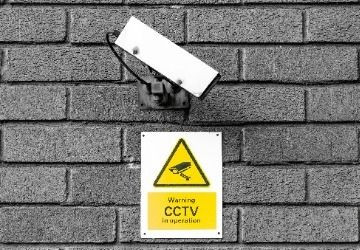Insight into Surveillance: Delving Deep into the Realm of CCTV
- February 22, 2024

In a world increasingly dominated by the need for security and surveillance, Closed Circuit Television (CCTV) systems have emerged as a cornerstone of safety strategies for businesses and homeowners alike. Drawing from over a decade of experience in security engineering recruitment, I've witnessed the evolution of CCTV technology firsthand, observing its transformation from rudimentary setups to sophisticated networks of intelligent cameras. The discussions to follow aim to demystify the technology behind CCTV, delve into the variety of systems available on the market, and provide a comprehensive guide for anyone considering CCTV as a security measure.
Exploring CCTV World
- CCTV basics and types
- Introduction to CCTV and its working.
- Different types of CCTV cameras and systems.
- Pros and cons of CCTV
- Benefits and drawbacks of using CCTV.
- Legal, cost, and maintenance
- Legality of installing CCTV, cost considerations, and maintenance tips.
What is CCTV? A beginner’s guide to surveillance cameras
What is CCTV?
At its core, CCTV, or Closed Circuit Television, is a system comprised of cameras, recorders, and displays for monitoring activities in a variety of environments. Unlike broadcast television, the signal in a CCTV system is not openly transmitted but is designed for limited (often private) views, typically for security and surveillance purposes. The origins of CCTV can be traced back to wartime needs for monitoring, but today, its applications span from crime prevention to traffic monitoring and beyond.
How does CCTV work?
A CCTV system operates through a network of cameras that capture footage of the surrounding area. These cameras are directly connected to a set of monitors and recorders, enabling live viewing and storage of the captured video for future reference. The sophistication of these systems can vary widely, from simple setups involving a single camera and monitor to complex networks featuring multiple cameras, advanced recorders, and even artificial intelligence (AI) for facial recognition and motion detection.
What are the different types of CCTV cameras?
Dome cameras
Predominantly used in retail settings, dome cameras are named for their dome-shaped casing, which makes it difficult for onlookers to discern the camera's direction. Their discreet appearance and wide-angle coverage make them a popular choice.
Personal Experience with CCTV Cameras
Real-life Scenario with Dome Cameras
I remember when my neighbour, Sarah, had an issue with theft in her backyard. She decided to install dome cameras to monitor the area. One night, the cameras captured clear footage of someone trespassing. Thanks to the CCTV system, Sarah could provide the police with vital evidence that helped them catch the culprit. This experience highlighted the effectiveness of dome cameras in enhancing security and providing peace of mind.
Bullet cameras
Characterized by their long, cylindrical shape, bullet cameras are typically mounted on walls or ceilings and are ideal for outdoor use due to their weather-resistant casings and infrared capabilities.
C-mount cameras
C-mount cameras distinguish themselves with the ability to use detachable lenses, allowing for customization of the field of view. This flexibility makes them suitable for monitoring varying distances.
PTZ cameras
PTZ (Pan-Tilt-Zoom) cameras offer the ability to remotely control their pan, tilt, and zoom operations, providing operators with the capability to adjust their focus on different areas and subjects as needed.
Day/Night cameras
These cameras are designed to operate under varying light conditions, ensuring clear video footage both during the day and at night, even in environments with minimal lighting.
Infrared/Night Vision cameras
Equipped with infrared LEDs, these cameras can capture clear video in complete darkness, making them essential for round-the-clock surveillance needs.
Network/IP cameras
Network/IP cameras transmit footage over the internet, allowing for remote viewing and management. This flexibility has made them increasingly popular for modern surveillance needs.
What are the different types of CCTV systems?
Wired systems
Wired CCTV systems are known for their reliability, as they are less susceptible to interference than their wireless counterparts. However, their installation can be more complex, often requiring professional setup.
Wireless systems
Offering ease of installation and flexibility in camera placement, wireless systems transmit video signals over the internet or other wireless networks. While convenient, they can sometimes suffer from interference and security vulnerabilities.
Analog systems
Analog CCTV systems transmit video over coaxial cables to a DVR (Digital Video Recorder), where it is converted into a digital format for storage and viewing. These systems are gradually being overshadowed by more advanced technologies.
IP systems
IP (Internet Protocol) systems represent the cutting edge of CCTV technology, transmitting footage digitally over a network. This approach not only improves video quality but also offers advanced features like remote viewing and integration with other security systems.
What are the benefits of using CCTV?
CCTV systems offer a multitude of benefits, ranging from deterring criminal activity to providing valuable evidence in the event of a crime. They also play a crucial role in monitoring operations, enhancing safety protocols, and even improving customer service by analyzing foot traffic patterns.
What are the disadvantages of using CCTV?
Despite their numerous advantages, CCTV systems are not without their drawbacks. Privacy concerns are at the forefront, as the pervasive nature of surveillance can lead to issues of consent and personal freedom. Additionally, the cost of high-end systems and the potential for technical issues can pose significant challenges.
Is it legal to install a CCTV system?
The legality of CCTV installation varies by jurisdiction, but generally, it is permitted provided that it complies with privacy laws and regulations. It's crucial to understand the specific requirements in your area, such as signage and data protection obligations, to ensure compliance.
How much does a CCTV system cost?
The cost of a CCTV system can vary widely depending on factors such as the number of cameras, the type of system (analog vs. IP), and the level of sophistication required. Basic setups can be relatively affordable, but high-end systems with advanced features can represent a significant investment.
How do I install a CCTV system?
Installation procedures differ based on the type of system and the complexity of the setup. While some wireless and smaller systems can be DIY projects, professional installation is recommended for more comprehensive systems to ensure optimal functionality and compliance with legal standards.
How do I maintain a CCTV system?
Regular maintenance is key to ensuring the longevity and effectiveness of a CCTV system. This includes tasks such as cleaning camera lenses, checking for firmware updates, and ensuring that recording devices have sufficient storage capacity.
What is the future of CCTV?
The future of CCTV lies in the integration of AI and machine learning technologies, which promise to revolutionize the way surveillance systems operate. From automatic threat detection to behavioral analysis, these advancements will enable more proactive security measures, transforming CCTV from a passive monitoring tool into an active security solution.
Exploring the world of CCTV reveals a complex landscape of technologies, applications, and considerations. From the basic principles of how these systems operate to the cutting-edge advancements on the horizon, it's clear that CCTV plays an indispensable role in modern security strategies. As technology continues to evolve, so too will the capabilities and applications of CCTV systems, ensuring that they remain an essential tool in the quest for safety and security.
Drawing upon years of experience in the security engineering field, I've observed the transformative impact of CCTV technology across various sectors. It's a testament to the ongoing innovation in the field and the ever-growing importance of surveillance in our daily lives. Whether for a small business owner looking to protect their livelihood or a city official tasked with safeguarding public spaces, understanding the nuances of CCTV is more critical than ever.
Questions & Answers
Who can benefit from exploring the world of CCTV?
Homeowners, business owners, and security professionals can benefit.
What is the importance of CCTV in today's world?
CCTV helps in deterring crime, monitoring activities, and enhancing security.
How can one stay updated with CCTV technology advancements?
Attend workshops, follow industry blogs, and join trade associations.
Why do some people hesitate to invest in CCTV systems?
Some may have privacy concerns or worry about installation costs.
What are some common features to look for in CCTV systems?
High-resolution cameras, remote viewing capability, and motion detection.
How can CCTV systems be integrated with other security measures?
CCTV systems can be linked with alarms, access control systems, and lighting.


